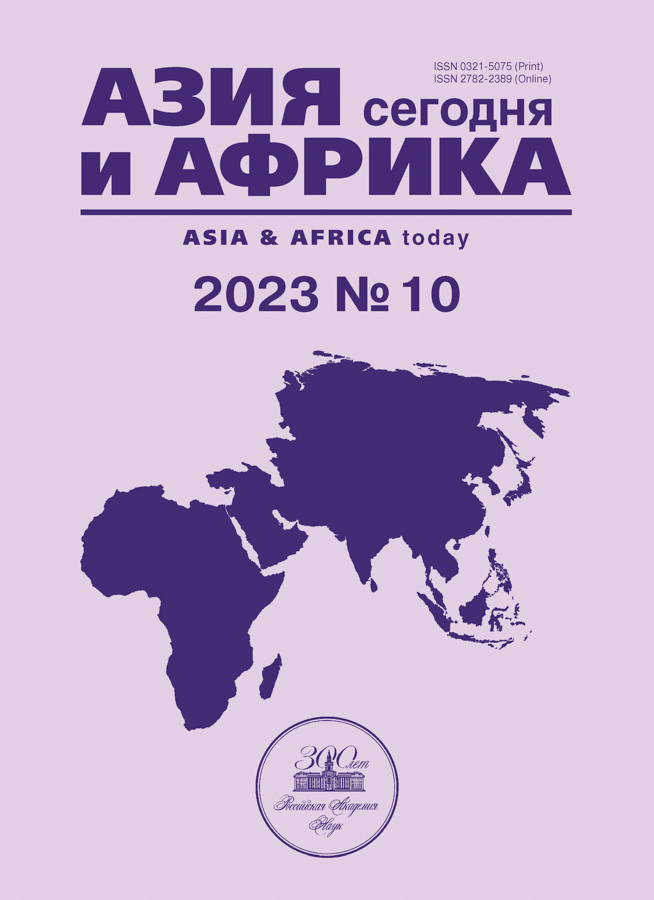Positive Discrimination in India: New Approaches to Contemporary Socio-Economic Issues
- 作者: Starikova M.N.1
-
隶属关系:
- MGIMO
- 期: 编号 10 (2023)
- 页面: 26-33
- 栏目: Politics, economics
- URL: https://rjmseer.com/0321-5075/article/view/647343
- DOI: https://doi.org/10.31857/S032150750028099-0
- ID: 647343
如何引用文章
详细
In contemporary India, the policy of positive discrimination aims to help socially backward classes of the society which includes Scheduled castes, Scheduled tribes and Other Backward Classes. The state provides reservations in educational institutions and public employment to them. These categories include only some groups of the religious communities, Dalits and also the members of the middle and low castes of the Hindu community. However, in 2019 Narendra Modi’s government passed the constitutional amendment that allows citizens with low income to apply for 10% quota places regardless of their religion and cast status.Public ambiguously accepted the reform, but the Supreme Court upheld the Amendment. The economically backward citizens who do not belong to any reserved category now have the reservation for admission in educational institutions and government jobs. Muslims as well as members of the other religious minorities who are not covered by the existing quotas now can also enroll in the educational institutions or enter the civil service. Despite the positive nature of the reform for the poor citizens many still believe that it is another way to attract the votes during the elections.
参考
- Suri K.S. 1994. Caste reservations in India: policy and politics. The Indian Journal of Political Science. Vol. 55. № 1. Pp. 37–54.
- Юрлова Е.С. «Неприкасаемые» в Индии. М.: Наука, 1989.
- Rajagopal K. SC to examine Dalit Christians’ plea that reservation should be “religion neutral”. The Hindu. 08.01.2020. https://www.thehindu.com/news/national/sc-to-examine-dalit-christians-plea-that-reservation-should-be-religion-neutral/article30512888.ece (accessed 10.10.2021)
- Юрлова Е.С. Роль каст в современной Индии. Азия и Африка сегодня. 2018. № 4. С. 10–17. doi: 10.7868/S0321507518040025.
- Report of the Backward Classes Commission. Government of India. First Part. Vol. I, II.
- Hassan Z. Reservation for Muslims. Redressing disadvantages. A symposium on reservations and the private sector. Seminar. May, 2005. https://www.india-seminar.com/2005/549/549%20zoya%20hassan.htm (accessed 14.02.2023)
- Nauriya A. 1991. Reservations in Public Employment: Modified Mandal Scheme. Economic and Political Weekly. Vol. 26. № 43. Pp. 2454–2456.
- Ameerudheen T.A. Why communist parties in Kerala are insistent on job reservation for upper-caste poor. Scroll, 01.12.2017. https://scroll.in/article/859286/why-communist-parties-in-kerala-are-insistent-on-job-reservation-for-upper-caste-poor (accessed 18.02.2023)
- Kumar A., Kumar G. Setting Rs 8 lakh per annum as the upper income limit to be eligible for the EWS quota is a cruel joke to Indians who are actually poor. The Wire, 07.02.2019. https://thewire.in/government/10-percent-quota-ews-narendra-modi (accessed 20.03.2023)
- Prasad M. ‘Perverting the Constitution’: The Case Against 10% Reservation. The Wire, 29.01.2019. https://thewire.in/law/economic-quota-bill-case-against-reservation (accessed 24.02.2023)
- Nambudiri S. The reservation conundrum. The Times of India, 28.11.2020. https://timesofindia.indiatimes.com/blogs/tracking-indian-communities/the-reservation-conundrum/ (accessed 24.02.2023)
- Rukmini S. Why Muslims have the first claim on any new ‘backward’ quota. Mint, 10.01.2019. https://livemint.com/Politics/3uqMGQ3o4UMhtdHnxaGocO/What-the-general-category-reservation-bill-means-for-Muslims.html (accessed 25.02.2023)
- Shariff A., Bhat M.M.A. Economically Weaker Section quota in India: Realistic Target Group and Objective Criteria for Eligibility. USIPI Policy Paper. May 2019. https://www.researchgate.net/publication/333699612_Economically_Weaker_Section_quota_in_India_Realistic_Target_Group_and_Objective_Criteria_for_Eligibility (accessed 25.02.2023)
- Ahluwalia S. After EWS quota, only 10 per cent of India is left out. Deccan Chronicle, 16.01.2019. https://deccanchronicle.com/opinion/columnists/160119/after-ews-quota-only-10-per-cent-of-india-is-left-out.html (accessed 25.02.2023)
- कुमार स.झ. EWS Reservation: किसे मिलेगा EWS आरक्षण का फायदा, क्या हैं शर्तें, कहां फंसा था पेच? जानिए सबकुछ. Amar Ujala, 07.11.2022. Kumar S. Gh. EWS Reservation: Who will get the benefit of EWS reservation? What are the clauses? Amar Ujala, 07.11.2022. (In Hindi). https://www.amarujala.com/india-news/eligibility-of-ews-reservation-supreme-court-ews-reservation-verdict (accessed 15.03.2023)
补充文件









